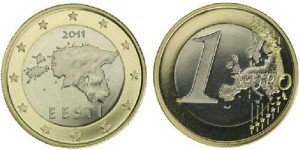Estonia, Euro Happy End.
1 Jan 2011 The dream has become reality. Estonia is now totally part of Europe after Tallinn’s adoption of the Euro. The long path, begun in the Eighties of the 20th century when the Baltic republic was enclosed forcefully in the USSR, has come to the most cheerful happy end.
The dream has become reality. Estonia is now totally part of Europe after Tallinn’s adoption of the Euro. The long path, begun in the Eighties of the 20th century when the Baltic republic was enclosed forcefully in the USSR, has come to the most cheerful happy end.
After getting its independence from the Kremlin in 1991 Estonia started moving westwards away from the dominance of its mighty neighbour. In 2004 Tallinn entered the European Union and NATO. But it was not enough for the young Estonian rulers. “We are at sea in a small boat tied to an ocean liner. In a storm or otherwise, we’d feel better being on board,” explained the Estonian Minister of Finance Jürgen Ligi why his country had decided to become the 17th State to use the common currency.
And without any doubt for the Baltic state of 1.3 million inhabitants, being in the Eurozone club is preferable to uncertainty linked to its outgoing kroon currency and is seen as a way to attract further investment. “In Estonia we are also sure that the euro will support trade,” Prime Minister Andrus Ansip told Reuters, pointing to gains for ordinary people. “Now people are just wasting their money in the currency exchange, why do they have to do that?” he said.
Estonia’s debt and budget deficit are among the lowest in the Eurozone. To meet the common currency entry terms, Ansip’s centre-right government made budget deficit cuts equal to more than 9 percent of GDP. Inflation also fell as the economy contracted nearly 14 percent in 2009 after a pre-crisis boom.
The European Commission raised in its fresh autumn forecast Estonia’s economic growth forecast to 2.4% for the year 2010 and 4.4% for 2011. In 2012 the economy should grow 3.5%.
“The foreign policy goals of Estonia have been to embed itself in as many international organisations and clubs as possible, so that it will never find itself isolated or without friends ever again,” Andres Kasekamp, director of the Estonian Foreign Policy Institute said. “Membership of the Eurozone will not only boost Estonia’s economic prosperity, but will enhance security,” he added.
But there are some sceptics. “Welcome to the Euro Titanic” is their slogan. “We are joining at the worst possible time and cannot be sure the Eurozone will exist in the same form as it does now. Even in 2011 there could be very big changes or reforms,” said lawyer Anti Poolamets, who lead an anti-Euro campaign.
Comment Form
Welcome
We are a group of long experienced European journalists and intellectuals interested in international politics and culture. We would like to exchange our opinion on new Europe and Russia.
Categories
- Breaking News (11)
- CIS (129)
- Climate (2)
- Energy&Economy (115)
- EU Eastern Dimension (85)
- Euro 2012 – Sochi 2014 – World Cup 2018, Sport (43)
- Euro-Integration (135)
- History Culture (198)
- International Policy (261)
- Military (74)
- Interviews (18)
- Italy – Italia – Suisse (47)
- Odd Enough (10)
- Poland and Baltic States (126)
- Religion (31)
- Russia (421)
- Survey (4)
- Turning points (4)
- Ukraine (176)
- Российские страницы (113)
Archives
- November 2020
- October 2020
- September 2020
- August 2020
- July 2020
- May 2020
- April 2020
- March 2020
- January 2020
- December 2019
- November 2019
- October 2019
- September 2019
- August 2019
- July 2019
- June 2019
- May 2019
- April 2019
- March 2019
- February 2019
- December 2018
- November 2018
- October 2018
- September 2018
- August 2018
- July 2018
- June 2018
- May 2018
- April 2018
- March 2018
- February 2018
- January 2018
- December 2017
- November 2017
- October 2017
- September 2017
- August 2017
- July 2017
- May 2017
- March 2017
- January 2017
- December 2016
- November 2016
- October 2016
- September 2016
- July 2016
- June 2016
- May 2016
- April 2016
- February 2016
- January 2016
- November 2015
- October 2015
- September 2015
- June 2015
- April 2015
- March 2015
- February 2015
- January 2015
- December 2014
- November 2014
- October 2014
- September 2014
- August 2014
- July 2014
- June 2014
- May 2014
- April 2014
- March 2014
- February 2014
- January 2014
- December 2013
- November 2013
- October 2013
- September 2013
- August 2013
- July 2013
- June 2013
- May 2013
- April 2013
- March 2013
- February 2013
- January 2013
- December 2012
- November 2012
- October 2012
- September 2012
- August 2012
- July 2012
- June 2012
- May 2012
- April 2012
- March 2012
- February 2012
- January 2012
- December 2011
- November 2011
- October 2011
- September 2011
- August 2011
- July 2011
- June 2011
- May 2011
- April 2011
- March 2011
- February 2011
- January 2011
- December 2010
- November 2010
- October 2010
- September 2010
- August 2010
- July 2010
- June 2010
- May 2010
- April 2010
- March 2010
- February 2010
- January 2010
- December 2009
- November 2009
- October 2009
- September 2009
- August 2009
Our books




